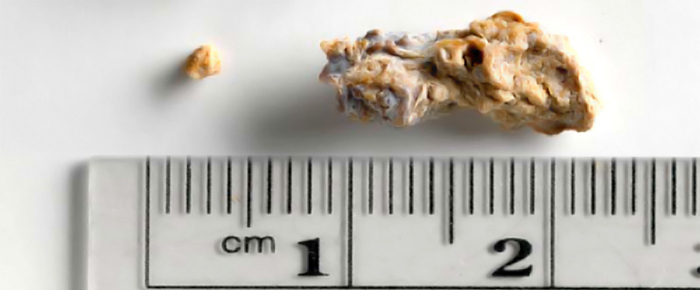
By Dr. Peter Kadile
Dr. Peter, my brother has had several episodes of passing kidney stones. I heard they are painful, is there a chance I could have them? –Ron, Indio
Kidney stones (renal lithiasis) are small masses that can form in the kidney. Depending on the size of the stones, they will typically leave the body in the urine stream. Symptoms can range from mild lower back pain to severe pain, nausea, vomiting , bloody and painful urination. Diagnosis is based on a patient’s clinical history, physical exam, urine analysis and imaging studies. Initial treatment may consist of pain medication and possibly other oral medications that will allow one to pass the stone. If unable to pass the stone, procedures such as shock wave therapy or surgery may be needed.
Kidney stones can be hereditary. An individual may have a genetic predisposition to form stones. Other risk factors include; diets high in protein, sodium, or oxalate rich foods (dark green vegetables), obesity, certain medications, and history of frequent urinary tract infections.
Dehydration is the most common cause of kidney stones, thus another very important reason to drink enough water, especially during the summer. Thirst is a poor indicator of hydration status. A good way to monitor if you are well hydrated is by the color of your urine. Drink enough water to keep your urine clear to light yellow.
Dr. K, my friend was just diagnosed with gallstones. If she drinks plenty of water, will she be able to pass them like kidney stones? – Jane, Cathedral City
Jane, gallstones are very different from kidney stones. Whereas hydration may allow kidney stones to pass in your urine, the path of a gallstone is very different.
Gallstones are hardened forms of digestive fluid in your gallbladder. The gallbladder is a small pear shaped organ located on the right side of your abdomen just below the liver.
Most gallstones are formed from cholesterol. Risk factors for developing gallstones are:
- being female
- age greater than 60
- obesity
- poor diet, high in fat, high in cholesterol, low in fiber
- family history
- diabetes
Gallstones may cause no symptoms, but if they get lodged in the duct leading out of the gallbladder, it may cause right sided abdominal discomfort to severe pain. If the stone does not get dislodged and gets “stuck”, a severe infection can develop called cholecystitis or possibly an infection of the pancreas (pancreatitis).
Treatment for symptomatic gallstones is usually surgery. Small gallstones may pass through the duct and into your small intestine, so it is possible to “pass” a gallstone with a bowel movement, but generally these stones don’t cause symptoms.
Dietary changes can help and I encourage modifications such as limiting high fat and high cholesterol foods. Some medications and supplements may dissolve gallstones, but not immediately, it may take several months.










































